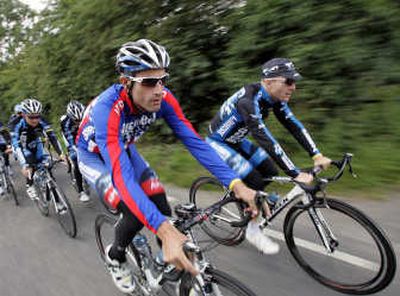Tour’s down cycle

LONDON – With 2006 winner Floyd Landis fighting doping charges and cycling under intense pressure to clean up, the 189 riders scheduled to start the Tour de France on Saturday will be highly scrutinized.
Doping scandals have damaged the sport’s credibility to such an extent that the race, which runs through July 29, is starting without a defending champion and several other big-name riders are absent.
“We are still in a difficult and heavy climate,” AG2R cyclist Christophe Moreau said Thursday. “What we need in cycling today is to talk about sport, talk about the winner.”
That’s unlikely to happen.
Prerace chatter is not about who will win, but whether the champion’s yellow jersey can be won cleanly.
“There have been a lot of problems,” T-Mobile rider Michael Rogers said. “We need transparency by all teams and all riders, and I think it is hard for us to go ahead if we don’t put the past behind us.”
While many riders have been suspended or fired, others are preparing for the 4.9-mile prologue in England’s capital armed with medical certificates allowing certain products to be used.
But such use of medical authorizations has led to concerns that prescriptions are being used as masking agents to hide other doping products.
“Last year, 60 percent of riders tested on the Tour had medical authorizations,” France’s Anti-Doping chief Pierre Bordry said Wednesday. “The AUT (a medical authorization) can become a passport for doping.”
According to the International Cycling Union, up to 40 percent of riders at this year’s race have an AUT.
Cycling officials said they sense a groundswell of opposition to cheating.
“More and more riders are calling us to say: ‘Don’t give up. Carry on, we’re behind you,’ ” Tour director Christian Prudhomme said. “There are more and more managers who are also saying, ‘It has to change, and we really want it to change.’ “
Rather than being a “Who’s who?” of stars such as Landis, 1997 winner Jan Ullrich and 2005 runner-up Ivan Basso, this month’s Tour is shaping up as a case of “Who’s left?” – only Astana rider Alexandre Vinokourov is a recognized favorite.
Ullrich and Basso were kicked out on the eve of last year’s race and since have been implicated in doping.
Ullrich denies doping.
Basso, who received a two-year doping penalty from the Italian cycling federation in mid-June, admits attempting to dope but said he never went through with it.
Landis tested positive for synthetic testosterone at last year’s Tour and his case is before an arbitration panel.
Ullrich and Basso were tied to a Spanish doping investigation known as Operation Puerto. More than 50 cyclists were implicated because of alleged ties to Eufemiano Fuentes, a doctor accused of running a blood-doping clinic in Madrid.
“It’s clear that last year’s atmosphere didn’t help,” Moreau said. “The time that has passed since then has passed too slowly … (things have) stagnated too much.”
Moreau and the other 188 riders all had blood tests early Thursday morning. UCI doctor Marc Vandevyvere signed a document saying none of the tests had come back positive.
Measures to stop cheating appear to be getting more intense.
The ICU requested that all 600 ProTour cyclists sign a charter saying they are not involved in doping and promising to submit DNA samples to Spanish authorities for the Operation Puerto probe.
Cyclists who sign the charter also must agree to pay a year’s salary on top of a two-year ban if caught doping.
Prudhomme said anyone who refuses to sign the charter will not take part in the Tour.